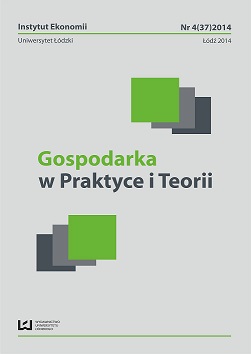The Impact of Weather Risk on the Value of Ecosystem Services
DOI:
https://doi.org/10.18778/1429-3730.37.03Keywords:
value and valuation of ecosystem services, weather risk, agricultural industryAbstract
Natural resources provide by ecosystems are the basis of our economic activities and determine the quality of life and social cohesion. However, the way in which we organize our economies, not sufficiently taken into account the following relationship – the economy can not exist without the environment and the environment copes well without the economy. The concept of ecosystem services is one of the tools to conduct a discussion on the relationship of society from nature. It allows a concise representation of the relationship between the basic concepts of ecological and economical and the total analysis of these two subsystems. The question is: how do weather conditions affect the value of ecosystem services? Does such an analysis is feasible? The purpose of this article is a polemic on the impact of weather risk on the value of ecosystem services. What is worth emphasizing one of the most dangerous effects of climate change is progressive worsening of the quantity and strength of extreme weather events that cause losses not only purely a social and economic but also natural. In addition, the effect of climate change are not only weather anomalies but also changes the nature of the weather, which also significantly affect the value of ecosystem services. Unfortunately, because of the lack of appropriate tools to collect data on natural losses caused by extreme weather makes it is impossible to carry out analyzes of the impact of weather risk on the value of ecosystem services. At the moment is only possible theoretical polemic. The examples are given in agriculture losses caused by weather events of catastrophic and not catastrophic indicate the need to design appropriate instruments to support reporting of losses incurred.
References
Barrieu P., A primer on weather derivatives, HEC, London 2008.
Google Scholar
Barrieu P., Scaillet O., A primer on weather derivatives, Springer, London 2008.
Google Scholar
DOI: https://doi.org/10.1007/978-1-4419-1129-2_5
Bąk A., Dekompozycyjne metody pomiaru preferencji w badaniach marketingowych, Wydawnictwo AE we Wrocławiu, Wrocław 2004.
Google Scholar
Brink P., Rayment M., Bräuer I., Braat L. et al., Further Developing Assumptions on Monetary Valuation of Biodiversity Cost Of Policy Inaction (COPI), Contract 07.0307/2008/514422/ETU/ G1, Institute for European Environmental Policy (IEEP), London–Brussels 2009.
Google Scholar
Cogen J., What is Weather Risk?, 1998; http://retailenergy.com/articles/weather.htm.
Google Scholar
Gral J., Stoła. H., Dorzecze Wisły. Monografia powodzi lipiec 1997, Instytut Meteorologii i Gospodarki Wodnej, PAN, Warszawa 2009.
Google Scholar
GUS, Mały Rocznik Statystyczny 2005, Warszawa 2005.
Google Scholar
Hanzel A., Metody identyfikacji ryzyka, [w:] Ubezpieczenia ryzyka katastroficznego, Akademia Ekonomiczna we Wrocławiu, Katowice 2008.
Google Scholar
Hurduzen G., Constantin L., Several aspects regarding weather and weather derivatives, “The Romanian Economic Journal” 2008, no. 1.
Google Scholar
Jankowski P., Wojciechowska K., Specyfika ryzyka katastroficznego w działalności rolniczej, [w:] Ubezpieczenia w zarządzaniu ryzykiem, PTE, Toruń 2010.
Google Scholar
Kremen C., Managing ecosystem services: what do we need to know about their ecology?, “Ecology Letters” 2005.
Google Scholar
DOI: https://doi.org/10.1111/j.1461-0248.2005.00751.x
Ku A., Betting on the weather, “Global Energy Business” 2001, no. 7–8.
Google Scholar
Mader A., Patrickson S., Ekonomia ekosystemów i bioróżnorodności w polityce lokalnej i regionalnej, Poradnik TEEB dla miast: usługi ekosystemów w gospodarce miejskiej, Fundacja Sendzimira, Kraków 2011.
Google Scholar
McWilliams D., Does the Weather Affect the European Economy?, Paper presented at 2004 WRMA Conference, London 2004.
Google Scholar
Milenijna Ocena Ekosystemów, Ecosystems and Human Well-being: a Framework for Assessment, 2005; www.millenniumassessment.org/en/Framework.aspx.
Google Scholar
Preś J.(2004), Instrumenty pochodne w ograniczaniu ryzyka pogodowego, „Rynek Terminowy” 2004, nr 3.
Google Scholar
Rapkiewicz M., Ubezpieczenia w rolnictwie a powódź, „Gazeta Ubezpieczeniowa” 2010, nr 29.
Google Scholar
Sagan A., Badania marketingowe. Podstawowe kierunki, PWE, Kraków 2004.
Google Scholar
Szymańska, A.I., Metodyczne problemy badań preferencji konsumenckich, „Zeszyty Naukowe AE w Krakowie” 2007, nr 739.
Google Scholar
Weiner J., Życie i ewolucja biosfery, PWN, Warszawa 2003.
Google Scholar
Wspólnoty Europejskie, Ekonomia systemów i bioróżnorodności – raport wstępny, Brussels 2008.
Google Scholar
Rządowe Centrum Bezpieczeństwa, Zagrożenia okresowe występujące w Polsce, Warszawa 2010.
Google Scholar
Zuberek W., Przewidywanie geologicznych zagrożeń i katastrof naturalnych, „Gospodarka Surowcami Mineralnymi” 2008, t. 24, z. 2–3.
Google Scholar
Zwierna K., Discrete Choince Experiments In Marketing, Physica-Verlag, Heidelberg–New York 1997.
Google Scholar
www.consus.eu/pl/derywaty_pogodowe.
Google Scholar








